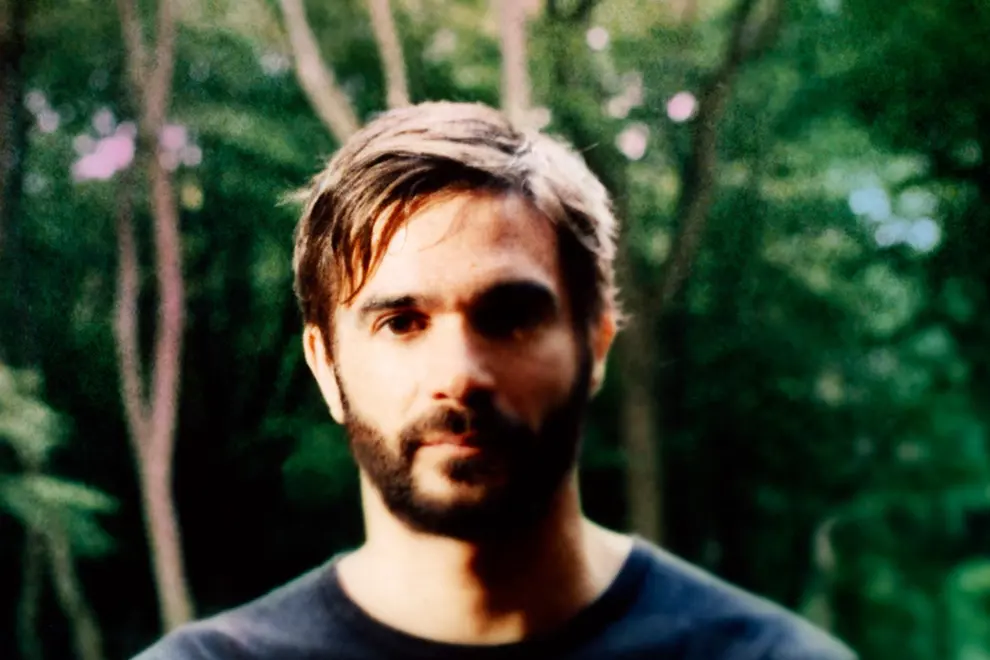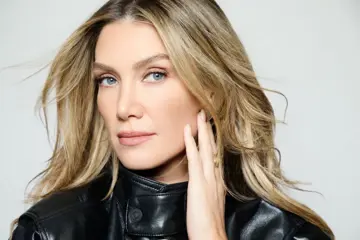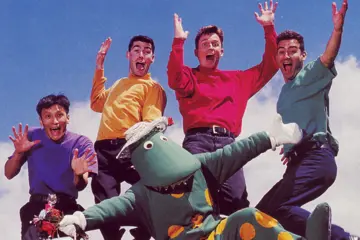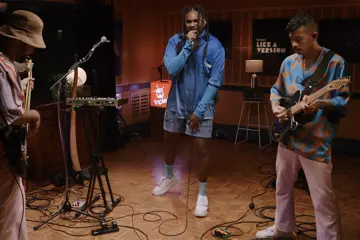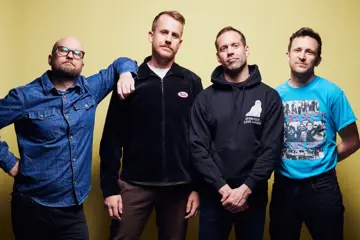For over two decades, British producer Jon Hopkins has been crafting some of the most intricate and captivating electronic music opuses across a myriad of albums, EPs, scores and soundtracks, and collaborative releases.
Straddling the worlds of ambient and luscious, layered techno, Hopkins initially found himself getting attention from his work with the likes of Brian Eno and Coldplay before setting off on his solo journey, with debut album Opalescent dropping back in 2001.
Having honed his craft and sound over the years, Hopkins albums have become the stuff of electronic music legend, with Immunity (2013) nominated for the Mercury Prize, and 2018’s Singularity getting a Grammy nomination, receiving mainstream recognition without compromising his sound, and in the process releasing two of the decade’s best electronic music full-lengths.
Always working on new projects, Hopkins has been as busy as ever over the last 12 months including dropping his latest full-length Music For Psychedelic Therapy in November 2021. As the name implies, the record is designed with meditative practices in mind and completely different from his previous full-lengths, being “an album with no beats, not one drum sound, something that is closer to a classical symphony than a dance / electronica record.”
Don't miss a beat with our FREE daily newsletter
Among his many recent musical endeavours, Hopkins composed a 32-channel, 360 degree soundtrack for the trippy & transcendental Dreamachine art installation; remixing electronic music legends Orbital’s iconic Halycon & On; and dropping the huge collaborative tracks To Feel Again / Trois with the likes of Kelly Lee Owens, Sultan + Shepard & Jerro.
On tour around Australia at the end of 2022, Hopkins is in the country supporting Rufus Du Sol as well as playing his own headline DJ sets in clubs and squeezing in a listening session for Music For Psychedelic Therapy. We jumped on the line with Hopkins to catch up on all of his recent projects and ended up having a deep, free-flowing chat!
While I was catching up on everything you’ve been doing lately to prepare for this interview, one main thing that really jumped out at me was collaboration - how important is collaborating to you and your artistic process?
Yeah, it’s something I’ve done all along, which I think is going to be one of the reasons why my solo albums are quite a rare occurrence you know, in all these years I haven’t done that many solo records. I’ve done a few full collaborative ones, a few film scores, a few one off tracks… to be honest with you I find it a lot easier, like for example the most recent collaboration with a huge list of other people, To Feel Again, that track - so much of it was already there, and I really love the job of pulling things together, curating things, and the starting point coming from someone else, that’s something I love. I know my own starting points, and it’s cool to do that as well and send that off and let someone write a lead part on top or whatever, but a huge amount of the more kind of vacuum sealed element of the process is removed, you know, you’re not in your own prism of overworking chaos, and you end up with this much freer flowing situation sometimes. So yeah, I think it’s something I’m always going to do, and I’ve got quite a few more in the pipeline for next year too, rather than worrying about albums. So yeah, it’s my favourite.
I’m not even gonna try to pry what those upcoming ones are out of you, but I’m also not surprised to hear that you’ve got more coming up…
Well the thing about the ones that aren’t finished and the reason I don't talk about them is because actually, you don't know if they're going to ever get finished. There's a lot of just sitting around, and sometimes people are busy, or sometimes they just don't work out very well. So you can say, “Okay, I'm working with this person”, then I get very excited, and then it doesn't get finished. So yeah, we'll see. That's a pretty cool thing, something that we'll just tease.
So broadly speaking it sounds like the way these collabs happen is either people reach out to you for you to work with them or remix their stuff, or vice versa, and I was reading an interview with HAAi where she mentioned you hitting her up on Instagram after she posted a snippet of an idea, so yeah, how do collabs usually go down?
We were already friends for some years,and we've done loads of shows together, but we hadn't made a track together yet. And it was just yeah, that was amazing timing, she posted something on a day I was feeling really kind of receptive, and it happened in such a nice, organic way. I mean, I like to work with people I've already met as a rule, kind of let things happen as organically as possible. I don't think I've ever actually just got in touch with somebody I don't know. I like to think of the music being released as, it's almost like a bat signal. Like you're sending out something and then people come back with ideas and it calls in things, you know, the music kind of does the connecting for you. So I put a lot of faith in that, rather than randomly just going, Oh, “I like this person's music. Let me contact them.”
And that’s interesting cos you do hear the other side of things with great collabs starting when an artist contacts another big artist in their field over DMs to work together having never met, just being fans… I’ve always found that a bit odd myself, but whatever works, I guess?
Yeah, I’ve never done that but I think like you say, whatever works. And lots of things probably get started that don’t get finished, like I was saying a minute ago, but I think no time is ever wasted when you’re composing. I find if I’ve started writing something and it’s not going particularly well, or I’m pitching something and it doesn’t get used or whatever - like I used to, about 10/15 years ago, I used to be trying to get into doing music for commercials to pay the rent and stuff, and there was probably 10 or 15 that I pitched out and didn’t get, and so many of them turned into pieces I used in film scores, or were album tracks or whatever. It’s almost as if it doesn’t matter what the cause for the idea was, where the spark came from.
I love how you said no time spent composing is wasted, pretty inspiring, and I’m curious if you’ve always had that perspective? Like you know 10, 15, what even longer 20 odd years ago, did you always feel that way or is that a perspective you’ve gained?
It’s interesting. I mean, I was mucking around with stuff since I got my first computer at age 13 and before that it was piano only, and obviously you’re just learning from the ground up and I never had any education on composing for electronic music, so it’s all just discovery through error. I did my first album when I was nineteen, and that one is pretty, you know, it was a very safe sounding gentle, weird, ambient album, and I didn’t really hit up against walls with that because I just didn’t really know what I was even aiming at, and it’s only when you start to push it a bit more with sound design and experimental layers, like with Singularity. There are some tracks on there like Neon Pattern Drum, it’s vastly complex in terms of sound design, and that was wildly difficult to finish because there were about five different Ableton sessions all maxed out with as many possible plugins as you could have. I knew vaguely why it wasn’t working, but I knew that it could work - as long as you still know that it could work.
Okay, so, there’s a track called Everything Connected on Singularity that was actually supposed to be on Immunity, but I couldn’t get it right, I couldn’t finish it. Of course, now looking back, it was never supposed to be on Immunity, it was a much more melancholy album, generally, it didn't have room for that kind of overly euphoric kind of sound. So I just sort of put it away and then brought it back to life and sped it up and put new beats on and did all this stuff later. So I have a feeling that all the unfinished ideas that are sitting around will end up as finished. I mean, sometimes it's as simple as taking something that's not quite worked, and resampling the whole track and mangling it and just dropping the pitch and just stretching out and just seeing what's there, because often, you uncover things that you would never usually. We all do this we all fuck around until something sounds good, it’s a sort of baseline kind of technique for electronic music, whether you pretend it's intentional or not. I kind of really embrace the fact that none of that stuff's intentional, so I just like destroying things and seeing what I can find in the rubble.
My brain’s still stuck on the thought of five maxed out Ableton sessions, jesus, that’s making me anxious just thinking about it!
Oh it was like at least five, I meant honestly it was horrible, it’s not a nice feeling. I work with a brilliant mix engineer named Cherif Hashizume and when I’d max out a session, he would come in and organise it and print things and set up a new one and then I’ll kind of go into that and max that out. It’ll become chaos and he’ll sort it all out, but yeah, I haven’t been making anything like that recently, and it’s been quite fun to be honest.
So I wanted to ask about a few different things you have been making recently, including an interesting project, the Dream Machine, which was a full 360 degree experience instead of just like left/right stereo channel - what was it like composing for that?
I’m a big believer in stereo, because particularly with headphones, it's not different from having 360 sound, right? It's all the illusion of depth rather than real depth, but that doesn't matter because it's reality - it's the reality for the listener. So I composed Dream Machine in stereo, as I did with my last album, and then I moved it into 360 degrees, so I don’t personally feel like I need to write in 360, I can just adapt to it. I feel like if you can absolutely optimize everything so that it feels as dimensional as possible in stereo, then moving it into 360 is extremely quick, and anyway, you can't just sit in those special studios writing freely for weeks on end, unless you have an insane budget - we don't so I don't think it matters really.I like to write in the comfort of my studio and in the hours I want to work in, without thinking about the clock at all. Then rattle through it, really, with someone else operating because I don't operate the surround sound, I just kind of direct and whoever's there operating. I mean, that guy Emery, who I worked with on spatializing my last album was a total genius, he's a total genius, and he just kind of instinctively knows where things should sit. So he would do a pass of that, and I can kind of come in and say yes and no to things and that's really, that's his area of expertise. So that's the way I like to work in 360.
Is this sort of stuff you want to do more of, and I’m curious because it seems pretty dependent on access to the space in order to properly soak it up?
Yeah, exactly. I mean, I personally don't think that it's particularly important to spatialize everything just because it's possible. Like, if I'm working on a new dance track, some sort of techno-y thing, I don't know, I have no interest in putting that in more than two speakers. It's not really necessary. But I am working on things which are much more installation, and I know that the moment will come where I can move things around in that way. But I think maybe if it's influencing the composition, it's only doing it in a subconscious way. So as ever, really, I don't tend to think about these things. When I'm writing. I'm just following that train of thought of like, “how do I write without obstruction? How do I not think about anything?”, and the answer is usually just to get on with it.
Please, give me the secret of how you do just get on with it!
Well, if there is a secret, it’s to meditate. It’s to give your brain a rest, you know, go jump into freezing water or go and breathe for 10 minutes, or go for a walk. If I ever give any advice to producers at all, it would be to never sit there trying to make something happen when nothing’s happened, and be okay with only doing one hours of work a day, you know, if that’s all that’s coming out, because your brain will work on it when you're not in the room. But as soon as you notice you've been sitting there for eight hours and you've done almost nothing and just get increasingly angry, your time is better spent doing something else, go and do something which involves the body, like go go running, go to the gym, whatever it is. Have a beer, you know, break that chain, break that kind of overthinking chain that your brain gets into and tries to go back to. That example I was talking about with all the different Ableton sessions, Neon Pattern Drum, that song I'd reached that kind of point many days in a row where it just wasn't moving, and the day that I finally kind of cracked it was just when I kind of gave up at 2pm. I went to the pub with my friend Rick Holland, who helped me write a lot of the titles for Immunity, the actual track titles, and we just drank like five pints in the sun and had a fucking laugh. And then I went and hung out with my girlfriend and then the next morning I woke up and I just knew how to finish it. And all it was was just having a break and a really fun time and just letting go of what I was holding on to.
And I guess that’s still easier said than done at times, like you’ve got to have experienced it to understand that it really works like that. Speaking of meditation, and you’ve actually got a listening event for Music For Psychedelic Therapy tonight at the time we’re chatting and I’m curious - for those who can’t make a listening session, how would you like people to consume the music in their own home?
So I think it depends on what they have. but assuming they're normal, and they don't have a surround system, then a good pair of headphones lying down, it's as simple as that. And an eye mask, an eye mask on, But really, conscious listening is what that needs, it needs kind of, you're not going to be interrupted, you know, your phone is off, whatever. And then like your state of consciousness as well. Are you calm? Are you high? What are you doing with your mind at that point, it's designed to kind of work for any state of consciousness. But obviously, as the title implies, it's sort of optimized for altered states. So, you know, those are all up to the listener. But those are sort of the basics really, and these listening events are generally concentric circles of people lying down, and then the sound is coming from from all angles. So there's something to be said for the communal experience as well, but yeah, if you're at home on your own, then it's really just great headphones and an eye mask.
And whatever else your proclivities may be! So before we talk about your Australian shows happening at the moment, I do have to ask about remixing Orbital, and in particular to a lot of people THE Orbital song, what was that like?
And to me, yeah. What’s funny about that was it was years ago, like I did that so long ago. And like, four years ago, I think even playing early versions at Glastonbury, 2018 and 2019. And then for lots of different reasons, it didn't get released until this year, and I actually got an opportunity just to improve the mix a little bit just before we released so that was cool. But my brother, Sam, who's a couple years older than me, was very influential in my early electronic music tastes, and he played me that track when I was probably 14, or something, and obviously fell in love with it in the same way as everyone else did. So nearly 30 years later, the thing that really blew my mind was that they had all the stems, like, this is a track made in what was it 92 or something, I can't remember, and I don’t know what they would even have been recording on, ADAT or some weird format like that. I’m terrible at organisation, so it’s amazing that they had perfect quality stems of everything, all separated to play with. You do feel two trains of thought when you’re remixing something like this, it has this kind of weight to this, you know, there’s quite a lot of love for the track out in the world, and you don't want to fuck it up. And the second one is just get on with it, because it doesn't really matter if people don't like it, it's fine. So I just did what I really wanted to do, you know, recognizable enough, teasing, not too obvious at the beginning and then then just, you know, I wasn't trying to do anything hugely experimental I just really wanted that very kind of MDMA. Usually experimentalists really worked to be very, very kind of MDMA, beautiful, listen really, nothing more than that. Beautiful. Listen, really nothing. Nothing more than that.
I think you more than nailed it! So you’re in Australia at the moment, supporting Rufus and also doing some of your own DJ sets, but what’s it like doing a warm up live set for a headliner, how do you approach that?
I mean, it’s not something I’ve done very much of, I did a couple of weeks with Flume, mostly in America, a few months ago, so those are the first opening slots I've done for ages. And, you know, Flume and Rufus have both got way, way, way bigger crowds than me, so I kind of think, you know, a lot of them are not gonna have a clue of my music. So I quite enjoy the challenge of how am I going to do you know, often when you do the support like that you do like a 45 minute set quite often. So what can I cram in there, it's not like I have to hit certain tracks or people will be disappointed, because a lot of them won't have a clue, whereas in my own sets, I obviously have to play certain things, because people have come to hear those things. So it's kind of a great opportunity to try new things, but also really to just be very, I don't like the word professional, because it sounds sort of clinical, but just be kind of ruthlessly sharp with it and get in a really interesting, constant flow, like, not too droning, don't spend 10 minutes on a track, which is what I normally would do. So it's, it's a whole different job, really. It’s just sort of great to be out here doing this, and there’s also a lack of pressure when it’s not your show, you kind of play around a bit.
Then what about your “DJ sets” in 2022, you know, a Jon Hopkins DJ set isn’t a normal DJ set?
Yeah, so what I’ve done is I made this enormous Ableton session which encompasses all of my live show materials and all of my DJ set materials. It’s all just Ableton, and I use three different controllers and a keyboard. The idea is just to do everything with that one session, it’s something like 96 gigs, so you just open it and you get a vague idea of how to start, and whether it’s live or DJ, the idea is you play in roughly the same way. It works really well for me, you can play as ambient as you like or as heavy as you like because everything’s in there.
It sounds pretty intense to me! So finally Jon, is there anything coming up next year, any projects or anything you can share with us?
There’s nothing I can actually share with you for those reasons earlier, like I don’t know what’s gonna get finished. I can tell you that there’s a kind of album-ish project underway that’s sort of impossible to say much about at this point, because I haven't finished it and often things change radically. So next year is a mixture of new writing, finishing off collaborations that I'm halfway through and then seeing what else but also, I'm planning to take a fair few months off next year, because this year was crazy. You know, it's one of those years that a lot of musicians have had where you end up doing a mixture of shows postponed from two or three years, as well as new shows, and I basically ended up doing far more than my body was keen on so I'm pretty burnt out. So I think a bit of time off really is the plan as well.
I can’t even imagine! Well after some rest I’m excited to see what’s next, but in the meantime people can keep enjoying your latest releases and hopefully catch you while you’re hear in Australia. Jon, thanks much for chatting!
Thanks, Will, speak to you later.
Jon Hopkins Australia Tour 2022
Sat Dec 10 | Ellis Park, Adelaide SA (supporting Rufus Du Sol)
Thu Dec 15 | Flemington Racecourse, Melbourne VIC (supporting Rufus Du Sol)
Thu Dec 15 | Max Watt's, Melbourne VIC (DJ Set)
Fri Dec 16 | Flemington Racecourse, Melbourne VIC (supporting Rufus Du Sol)
Sat Dec 17 | Langley Park, Perth WA (supporting Rufus Du Sol)


